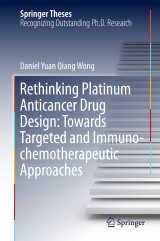Details

Rethinking Platinum Anticancer Drug Design: Towards Targeted and Immuno-chemotherapeutic Approaches
Springer Theses
|
CHF 142.00 |
|
| Verlag: | Springer |
| Format: | |
| Veröffentl.: | 18.06.2018 |
| ISBN/EAN: | 9789811085949 |
| Sprache: | englisch |
Dieses eBook enthält ein Wasserzeichen.
Beschreibungen
This thesis describes the authors’ pioneering efforts in the conceptualization and implementation of combined platinum-based immuno-chemotherapeutics, which represent a significant paradigm shift from the conventional approach of directly targeting cancer. The work described has opened up a rich and largely unexplored area for platinum-based drug design, and ultimately paves the way for superior immuno-chemotherapeutics with better clinical outcome for patients. Historically, the contribution of the immune system to chemotherapy outcomes has been neglected, as anticancer drugs were believed to be immunosuppressive. However, this has been challenged by contemporary evidence suggesting that many chemotherapeutics, including platinum-based agents, stimulate the innate and/or adaptive immune system and that these “secret allies” contribute tangibly to clinical outcomes. A multi-pronged immuno-chemotherapeutic approach not only shrinks tumors, but more importantly, reactivate dormant immuneresponses to malignancies, eliminating residual cancer cells.<br><p></p>
Introduction- Cisplatin- Now and Future.- Harnessing Chemoselective Imine Ligation for Tethering Bioactive Molecules to Platinum (IV) Prodrugs.- Probing the Platinum(IV) Prodrug Hypothesis - Are Platinum(IV) Complexes Really Prodrugs of Cisplatin?.- Induction of Targeted Necrosis with HER2-Targeted Platinum(IV) Anticancer Prodrugs.- Immuno-Chemotherapeutic Platinum(IV) Prodrugs of Cisplatin as Multimodal Anticancer Agents.- Induction of Immunogenic Cell Death by Chemotherapeutic Platinum Complexes.- Concluding Remarks.<br><p></p>
Daniel Wong was born in Singapore and graduated with honors from the National University of Singapore (NUS) in 2011. Encouraged by a positive undergraduate research experience, he then continued to complete his doctoral studies in NUS in 2015 under the guidance of Prof. Ang Wee Han, working mainly on the immuno-modulating effects of platinum agents for cancer therapy. In 2015, he joined Nanyang Technological University as a Research Fellow under the supervision of Prof. Par Nordlund, a renowned structural biologist. There, he employed structure-based drug design techniques against molecular targets in both immuno-oncology and malaria. At the same time, he is also experimenting with new progressive methodologies for simultaneous target and ligand discovery. Apart from research, Daniel likes mentoring students because of their infectious enthusiasm and he believes that the future rests upon them. Daniel is a recipient of the Wang Gungwu Medal (2016) for best PhD thesis in the Natural Sciences in NUS and the Springer Thesis Prize (2017).<br>
This thesis describes the authors’ pioneering efforts in the conceptualization and implementation of combined platinum-based immuno-chemotherapeutics, which represent a significant paradigm shift from the conventional approach of directly targeting cancer. The work described has opened up a rich and largely unexplored area for platinum-based drug design, and ultimately paves the way for superior immuno-chemotherapeutics with better clinical outcome for patients. Historically, the contribution of the immune system to chemotherapy outcomes has been neglected, as anticancer drugs were believed to be immunosuppressive. However, this has been challenged by contemporary evidence suggesting that many chemotherapeutics, including platinum-based agents, stimulate the innate and/or adaptive immune system and that these “secret allies” contribute tangibly to clinical outcomes. A multi-pronged immuno-chemotherapeutic approach not only shrinks tumors, but more importantly, reactivate dormant immuneresponses to malignancies, eliminating residual cancer cells.<p></p>
Winner of the Wang Gungwu Award for the best PhD thesis in the Natural Sciences by the National University of Singapore (2016) Summarizes the pioneering efforts in the conceptualization and implementation of combined platinum-based immuno-chemotherapeutics Addresses a significant paradigm shift from the conventional approach of directly targeting cancer Explores a rich and largely unexplored domain for platinum-based drug design for superior immuno-chemotherapeutics

















